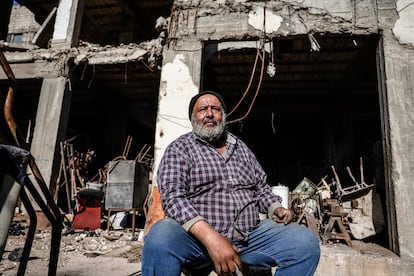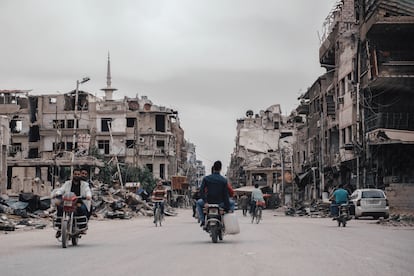Survivors of the Douma ghetto: ‘Syria will not forget the crimes of Bashar al-Assad’
Residents of the main opposition stronghold in Damascus province, who have suffered from famine, chemical attacks, and brutal repression, are demanding punishment for the regime’s leaders

Just 15 kilometers (9.3 miles) from the center of Damascus, in 2011 Douma was, before the Syrian civil war began, a prosperous peripheral city whose 150,000 inhabitants felt confident, despite their traditional religiosity, in the face of the secularism and modernity of the capital. Now only a third of them remain there. The signs of destruction in the square of the central mosque, where opposition groups met to organize the fight against the regime, now bear witness to the fate of Damascus’ main insurgent enclave. Its civilian population suffered a five-year siege by famine, some of the worst chemical attacks of the conflict, and a brutal repression that emptied their homes and razed their streets, turning the city into a ghetto of suffering.
“My family will never forgive, they demand punishment for the leaders of the regime,” says Samir al-Ammy, 53, with a look of hatred in his eyes, despite his apparent casualness. “Syria will not forget the crimes of Bashar al-Assad.” His blacksmith shop, on the main commercial street in Douma, stands on the site of the building of his family clan, which was destroyed by Syrian army missiles on February 22, 2018. He lost 17 members of his extended family, including one of his 20-year-old sons.
“The last 13 years have been hell for us […] we have lost a large part of our family, our homes, our businesses,” he recalls while pointing to the rusty remains of a rocket in what was once the basement. Death, destruction, and ruin is the legacy that Assad leaves behind in Douma. “Until recently, I had to hide another of my sons, aged 20, to prevent him from being mobilized and sent to the Aleppo front (in the north of the country),” he confesses with the fear that struck thousands of Syrian parents in the final stages of the regime.
Reconstruction is now the main concern for the inhabitants. Engineer Issa Muktaal, 62, is acting as head of the municipal administration of Douma. From the mayor's office, he runs the city's public services as interim mayor. "Some 8,000 people have already returned to the city since the fall of Assad, but we do not have the capacity to take them in," he laments.
Next to him sits one of the first returnees, Rachid Tammar, 40, who describes himself as a “businessman.” He returned to his city from Idlib, in northern Syria, where he was expelled by the regime in 2018 after the surrender of the opposition in Douma. His return has now been triumphant, shortly after the Islamist brigades of Hay’at Tahrir al-Sham (HTS) took over the Syrian capital. “I have come as a volunteer to advise the new municipal managers,” he explains, impeccably dressed in the midst of the misery of Douma. Before leaving, he repeats the usual slogans of the authorities of the new Syria: “There will be no personal revenge, we must turn the page and look to the future, but those responsible for war crimes will be arrested and tried.”

The rebel militia Jaish al-Islam resisted the siege of the Eastern Ghouta region, which includes Douma, for five years. They handed over their weapons to the army and left the enclave of the capital for opposition strongholds in the north of the country. Some 10,000 insurgent fighters and their accompanying civilians were then evacuated to the northern provinces of Idlib and Aleppo. The shortage of food and medicine had led to deaths from starvation and lack of medical care. Some 100,000 civilians remained stranded in the region.
Samir Aredin, a 32-year-old businessman, still lives on the same street in Douma where 43 civilians were killed in a chemical weapons attack by the regime in 2018. Among them were his wife and two children. He suffered severe chlorine gas poisoning, like hundreds of other residents, which left him with serious after-effects. He still seems stunned by the toxic content of the gas cylinders dropped from a helicopter on the building where he lived. “I will not rest until the culprits are convicted,” he says with determination. “There were no opposition militia posts on this street, only ordinary people. No one who has committed such a horrible crime can be forgiven, no one,” he warns. “The attack was launched to force the surrender of the opposition forces, who were ready to fight,” he says. His accusation was endorsed in 2020 by United Nations investigators.
Another chemical attack attributed to government forces caused hundreds of deaths (over 1,000, according to the opposition) in 2013, in Eastern Ghouta. The international community subsequently forced the regime to hand over its chemical arsenal for supervised destruction, although the United Nations suspects that it kept at least 1% of the lethal and toxic products it stored. Investigators from the Organisation for the Prohibition of Chemical Weapons confirmed the chlorine gas attack carried out in the streets of Douma in 2018 and attributed it to the Tiger Brigades, the regime’s elite forces. The use of these lethal weapons is prohibited by the Chemical Weapons Convention, which was ratified by Syria in 2013. The United States has just confirmed that it is working, through allies present on the ground in Syria, to destroy the chemical weapons depots that remain in the Arab country following the removal of 1,300 tons of toxic products completed by the international community in 2014.
Sign up for our weekly newsletter to get more English-language news coverage from EL PAÍS USA Edition
Tu suscripción se está usando en otro dispositivo
¿Quieres añadir otro usuario a tu suscripción?
Si continúas leyendo en este dispositivo, no se podrá leer en el otro.
FlechaTu suscripción se está usando en otro dispositivo y solo puedes acceder a EL PAÍS desde un dispositivo a la vez.
Si quieres compartir tu cuenta, cambia tu suscripción a la modalidad Premium, así podrás añadir otro usuario. Cada uno accederá con su propia cuenta de email, lo que os permitirá personalizar vuestra experiencia en EL PAÍS.
¿Tienes una suscripción de empresa? Accede aquí para contratar más cuentas.
En el caso de no saber quién está usando tu cuenta, te recomendamos cambiar tu contraseña aquí.
Si decides continuar compartiendo tu cuenta, este mensaje se mostrará en tu dispositivo y en el de la otra persona que está usando tu cuenta de forma indefinida, afectando a tu experiencia de lectura. Puedes consultar aquí los términos y condiciones de la suscripción digital.









































